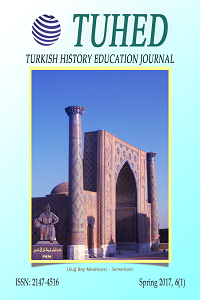Abstract
Ülkemizde genel olarak
tarih-edebiyat ilişkisine, özellikle tarih eğitiminde edebiyatın kullanımına
dair birçok çalışma bulunmaktadır. Bunlar, ilköğretim ve ortaöğretimde Türk
veya Osmanlı tarihinin öğretiminde veya çocuklara tarihi bilincin kazandırılmasında
tarihi romanların, tarihi hikâyelerin, efsane ve destanların rolünü inceleyen
ve analiz eden önemli çalışmalardır. Ancak hiç birisinde Avrupa tarihi
eğitiminde edebiyatın kullanımına değinilmemiştir.
Bu
makalede ise tarih eğitiminde, Modern Dönem (1750-1914) Avrupa tarihinde önemli
bir yere sahip olan Endüstri Devrimi, Fransız İhtilali, 1848 İhtilali, 19.
Yüzyılda işçilerin ve diğer toplumsal sınıfların durumu ve Yeni Emperyalizm
gibi olayların anlatımında, Charles Dickens, Anatole France, Gustave Flaubert,
Rudyard Kipling, Emile Zola ve Joseph Conrad gibi isimlerin eserlerinin
kullanımından örnekler verilecektir. Verilen örnekler üzerinden tarih
eğitiminde edebiyatın tamamlayıcı bir alan olarak kullanımını değerlendirilecek
ve analiz edilecektir.
Keywords
References
- Aktaş, Ö. (2014). Türk denizcilik tarihi öğretiminde kullanılabilecek romanlar üzerine bir değerlendirme. Sakarya Üniversitesi Eğitim Fakültesi Dergisi, S.28, s. 39-55.
- Armaoğlu, F. (2010). 19. Yüzyıl siyasi tarihi (1789-1914). İstanbul: Alkım.
- Ata, B. (2000). Tarih öğretiminde bir araç olarak tarihî romanlar. Türk Yurdu, 153-154, s. 158-166.
- Austen, J. (1998). Pride and prejudice. New York: Oxford University.
- Berman, M. (2013). Katı olan her şey buharlaşıyor. Çev. Bülent Peker, Ümit Altuğ, 16. Baskı. İstanbul: İletişim.
- Blanning, T. C. W. (1987). The French revolution: aristocrats versus bourgeois? New Jersey: Humanities.
- Bock, G. (2004). Avrupa tarihinde kadınlar, Çev. Zehra Aksu Yılmazer. İstanbul: Literatür.
- Breuilly, J. (2000). 1848 Devrimleri. D. Parker (Ed.). Batı’da devrimler ve devrimci gelenek, 1560-1991. Ankara: Dost.
- Briggs, A. (1993). Victorian cities. Berkeley, Los Angeles: University California Press.
- Carmen J. Nielson, C. J. (2014). Private women and the public good: charity and state formation in hamilton, Ontario, 1846–93. Vancouver: UBC.
Abstract
There have been many studies in Turkish on
history-literature relation and the use of literature in history education.
These studies mostly deal with the role historical novels, stories, myths and
epics play in developing an understanding of history and contributing to the
teaching and learning of Ottoman history or Turkish history courses in
elementary or middle schools. None deals with the use of novels in European
history courses.
This article, on the other hand, analyzes and
gives examples from various novels and literature by some writers such as Charles Dickens, Anatole France, Gustave
Flaubert, Rudyard Kipling, Emile Zola and Joseph Conrad in teaching a European
history course in universities.
References
- Aktaş, Ö. (2014). Türk denizcilik tarihi öğretiminde kullanılabilecek romanlar üzerine bir değerlendirme. Sakarya Üniversitesi Eğitim Fakültesi Dergisi, S.28, s. 39-55.
- Armaoğlu, F. (2010). 19. Yüzyıl siyasi tarihi (1789-1914). İstanbul: Alkım.
- Ata, B. (2000). Tarih öğretiminde bir araç olarak tarihî romanlar. Türk Yurdu, 153-154, s. 158-166.
- Austen, J. (1998). Pride and prejudice. New York: Oxford University.
- Berman, M. (2013). Katı olan her şey buharlaşıyor. Çev. Bülent Peker, Ümit Altuğ, 16. Baskı. İstanbul: İletişim.
- Blanning, T. C. W. (1987). The French revolution: aristocrats versus bourgeois? New Jersey: Humanities.
- Bock, G. (2004). Avrupa tarihinde kadınlar, Çev. Zehra Aksu Yılmazer. İstanbul: Literatür.
- Breuilly, J. (2000). 1848 Devrimleri. D. Parker (Ed.). Batı’da devrimler ve devrimci gelenek, 1560-1991. Ankara: Dost.
- Briggs, A. (1993). Victorian cities. Berkeley, Los Angeles: University California Press.
- Carmen J. Nielson, C. J. (2014). Private women and the public good: charity and state formation in hamilton, Ontario, 1846–93. Vancouver: UBC.
Details
| Journal Section | Research & Theoretical Articles |
|---|---|
| Authors | |
| Publication Date | May 21, 2017 |
| Submission Date | October 13, 2016 |
| Acceptance Date | March 1, 2017 |
| Published in Issue | Year 2017 Volume: 6 Issue: 1 |
ANNOUNCEMENTS:
1- APA7 Referencing Style:
As of May 2024, TUHED will follow APA 7 (American Psychological Association) style for referencing and citation. For more information, please refer to the TUHED template and writting guidelines.
2- Early Release:
According to the TUHED's new publication policy, the articles which have completed the evaluation process will be published online-first. It will no longer be necessary for manuscripts to wait until the “next issue”. Early Release articles will receive an international identification code (DOI), and identified page numbers.
3- Ethics Committee Approval:
In accordance with the ULAKBİM decision of 25 February 2020, Ethics Committee Approval must be obtained for studies on people (without age restrictions), this approval must be specified in the Method section of the article and signed Ethics Committee Approval must be uploaded to the system. Applications that do not meet these requirements will not be considered for publication.
4- New Publication Policy
Beginning from Spring 2021 issue TUHED will require all Turkish manuscripts to contain a full-text English translation. Manuscripts submitted in Turkish will be requested to have full-text English translation if they are accepted for publication after the review process.
Turkish History Education Journal site and its metadata are licensed under a Creative Commons Attribution-NonCommercial 4.0 International License
Permissions beyond the scope of this license is available at COPYRIGHT


